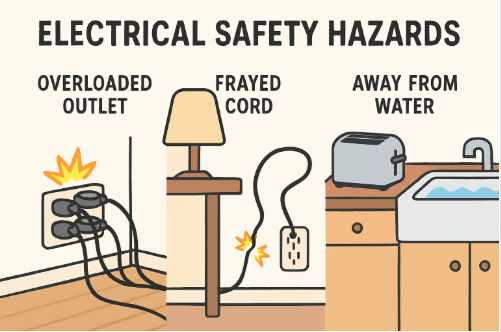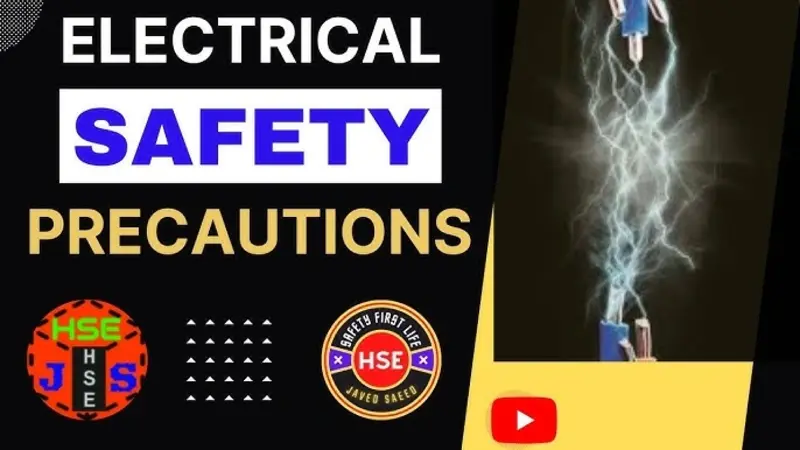Ensuring home electrical safety is paramount for every homeowner. Regularly inspect cords for damage and avoid overloading outlets to prevent fires. Always use extension cords temporarily, not as permanent wiring, and ensure they are appropriately rated for your appliances. Keep all electrical devices away from water, especially in bathrooms and kitchens, and consider installing Ground Fault Circuit Interrupters (GFCIs) in these areas for added protection. Familiarize yourself with your circuit breaker panel and know how to shut off power in an emergency. For complex electrical work or persistent issues, always consult a qualified electrician. Prioritizing these practices safeguards your family and home from potential hazards.
Introduction
Electricity is a modern necessity, powering everything from kitchen appliances to essential home security systems. However, the same power can also pose severe hazards if not managed correctly. Homeowners should be vigilant about electrical safety to protect their families, preserve their property, and ensure peace of mind. Consulting a qualified electrician Matthews NC, is one of the best ways to address concerns and ensure your home meets current safety standards.
Electrical hazards account for a significant number of house fires each year, so it’s crucial to stay proactive about electrical safety. These essential tips and practices will help you create a safer environment for everyone under your roof.
Regular Inspections
Performing regular inspections of your home’s electrical system is your first line of defense against potential hazards. Check for frayed or exposed wires, burnt smells near outlets, sparking, or flickering lights—each warning sign needs attention. Don’t ignore any buzzing sounds from switches or outlets, as these can indicate wiring issues or overloaded circuits. If problems are detected, contact a licensed professional immediately to prevent emergencies and ensure repairs are completed safely and up to code.
Avoid Overloading Outlets
One of the most common causes of electrical fires is overloaded outlets. Plugging too many cords into a single outlet can cause overheating and increase fire risk. Spread your devices across different outlets and use power strips with built-in circuit breakers if needed. Never plug multiple power strips or extension cords into one outlet—a practice called “daisy chaining”—as this may exceed your wiring’s capacity and pose severe danger. If your home lacks enough outlets, contact a professional electrician about installing additional ones in high-use areas.
Proper Use of Extension Cords
Extension cords are convenient for short-term use but should never become a permanent solution. Running cords under rugs, carpets, or furniture not only poses a tripping hazard but can also lead to insulation breakdown and potential fires. Never connect multiple extension cords together, as this increases resistance and heating. If you frequently rely on extension cords, consider upgrading your electrical system to include more accessible outlets or dedicated circuits for high-draw appliances.

Install GFCI Outlets
Ground Fault Circuit Interrupters (GFCIs) are especially important in areas where water and electricity may come into contact, such as bathrooms, kitchens, garages, and outdoor spaces. GFCIs protect you from electric shock by rapidly shutting off the power when a ground fault or current leak is detected. Upgrading to GFCI outlets in older homes can significantly increase safety with minimal investment. Ensure these outlets are tested monthly—most have a “Test” and “Reset” button for this purpose.
Keep Electrical Devices Away from Water
Water conducts electricity, making wet locations especially hazardous. Ensure no electrical devices are used near sinks, bathtubs, or other water sources. Always dry your hands before plugging in or unplugging a device, and never use electrical appliances while standing on a wet surface. Installing GFCI-protected outlets in all damp locations is a vital protective measure.
Use Correct Light Bulbs
Check each light fixture for its maximum wattage rating and ensure the bulbs you use do not exceed this limit. Overwattage can cause overheating, melting, or even fire. For enclosed fixtures, use bulbs specifically marked as safe for those conditions. Check compatibility when upgrading to energy-efficient LEDs, as some fixtures are unsuitable for certain bulbs due to heat management concerns.
Also read: Berkeley Hermes Roberts: Life as Rick Ross’ Youngest Daughter
Educate Family Members
Electrical safety is everyone’s responsibility. Teach children never to touch wires or outlets or use electrical items without supervision. Show all household members how to turn off the main circuit breaker in an emergency and ensure they know the warning signs of electrical trouble, such as frequent circuit breaker trips, outlet discoloration, or burning odors. Encourage the family to report any concerns right away for prompt resolution.
Schedule Professional Inspections
While routine self-checks are valuable, periodic inspections from a licensed electrician are essential, especially in homes over 20 years old or those that have undergone major renovations or appliance upgrades. A professional can identify hidden hazards, check grounding, evaluate service panel condition, and ensure your wiring meets modern safety codes. Schedule such inspections at least every three to five years, or sooner if you notice consistent issues.
Prioritizing these essential home electrical safety tips will help prevent accidents and create a safer living environment. When in doubt, always choose to consult a qualified professional rather than attempting risky DIY repairs. Protect your home, family, and investment by making electrical safety a top priority.
